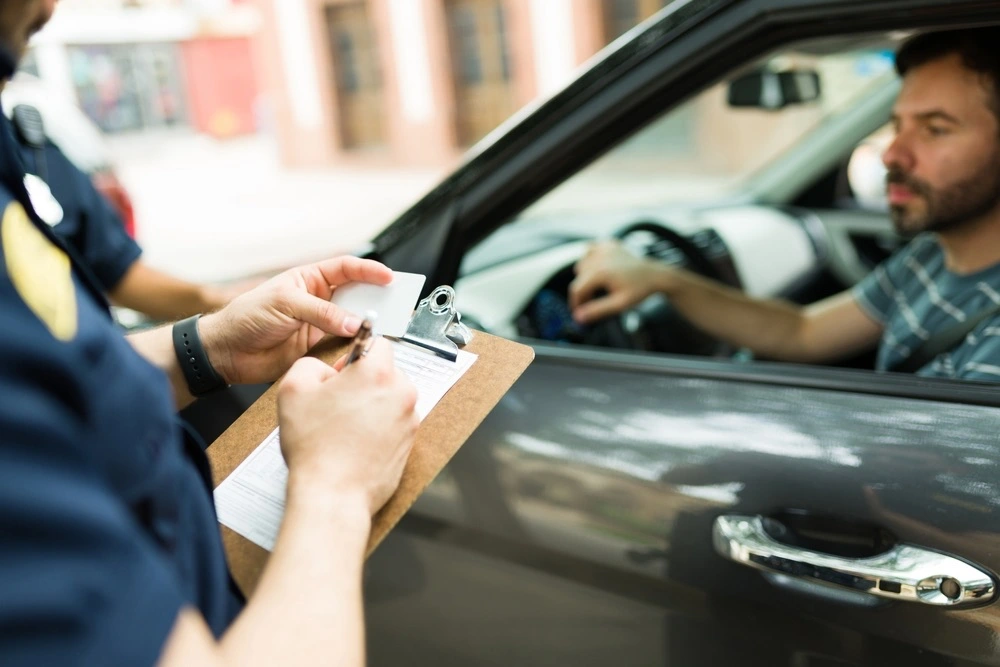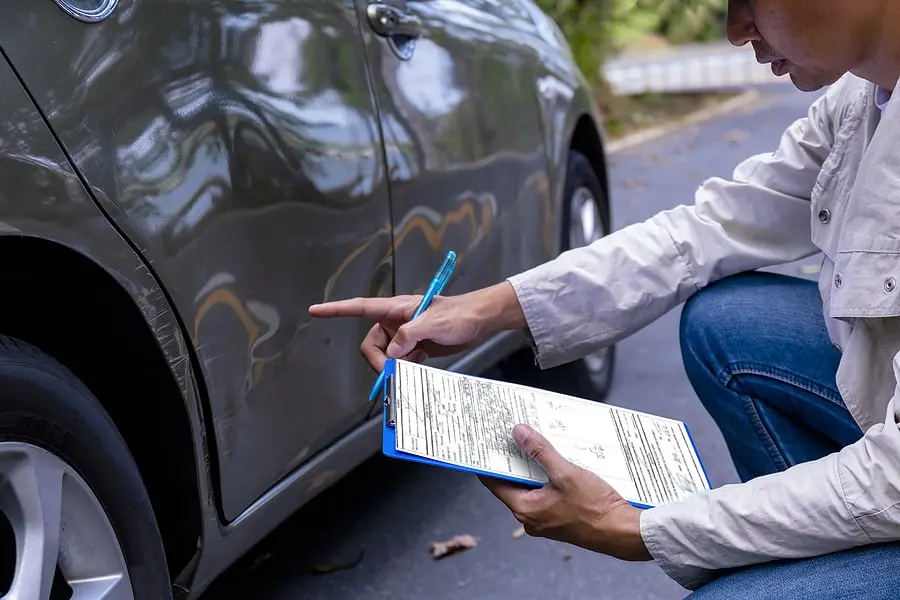Step-by-Step Guide: How to Obtain an Accident Report in Texas
After a car accident in Texas, obtaining your accident report is essential. Whether for insurance claims or legal matters, knowing how to obtain an accident report can make the process smoother. This article will guide you through securing your report efficiently, a critical resource in the aftermath of an accident.
Key Takeaways
- In Texas, car accidents resulting in injury, death, or property damage over $1,000 must be reported under the Texas Transportation Code to create an official record for insurance and legal purposes, and failing to report such incidents can lead to serious legal consequences, including license suspension and misdemeanor charges.
- Texas car accident reports can be obtained through two main methods: online via the Texas Department of Transportation’s (TxDOT’s) C.R.I.S system or by mailing a completed request form, each requiring specific information about the accident to prove the requester’s involvement.
- Car accident reports are critical for insurance companies and lawyers; they provide essential information to process claims, determine fault, and gather evidence for legal proceedings, whereas errors in the reports should be reported promptly and disputes with insurance may require legal assistance.
Understanding Texas Accident Report Requirements

Certain specific criteria in the Lone Star State dictate the necessity for a formal report in the event of an accident. According to the Texas Transportation Code, any car accident that results in death, injury, or property damage exceeding $1,000 must be reported. This requirement ensures that there is an official record of the accident, crucial for a multitude of reasons ranging from insurance claims to legal proceedings. In this context, Texas car accident reports play a vital role in documenting these incidents.
Failure to report such an accident can lead to severe consequences. Not only is it a violation of the Texas Transportation Code, but it could also result in the suspension of your driver’s license. So, it’s not just about staying in the good books of your insurance company, it’s also about staying on the right side of the law!
Reporting Thresholds
Clear thresholds for reporting car accidents have been established by the state of Texas. If an accident leads to the injury or fatality of an individual, or if it causes property damage that is visibly valued at $1,000 or more, it falls within the reporting threshold. These thresholds are not arbitrary but are designed to ensure that significant accidents are officially recorded.
While the monetary threshold for reporting property damage stands at $1,000, there are instances where the total damage could be as high as $25,000. In such cases, obtaining a Texas car accident report is not just a legal requirement but also a practical necessity to claim insurance or seek legal redress.
Legal Consequences of Not Reporting
Serious repercussions can arise from failing to report a qualifying accident in Texas. It can lead to legal penalties, including the suspension of the driver’s license for the person involved in the accident.
The prescribed penalty for not reporting an accident in Texas is a Class B misdemeanor if the damage to all vehicles is $200 or more. This penalty underscores the importance of following the Texas Transportation Code’s requirements for reporting car accidents, and it’s why understanding these requirements is so crucial to drivers in Texas.
Methods to Obtain Your Texas Accident Report
Once you’ve grasped the reporting requirements, you might naturally wonder, “How can I procure my Texas accident report?” The good news is that there are two easy methods: online access through the TxDOT’s C.R.I.S online purchase system or by mail.
Both these methods are designed to offer convenient access to your accident report, which contains important information about the driver involved, the vehicle, and the circumstances of the accident. However, getting your report does require some understanding of the process and the necessary information.

Online Access through TxDOT's C.R.I.S System
Let’s start with the online method, which is facilitated through TxDOT’s C.R.I.S (Crash Records Information System). This comprehensive platform is designed to make the search and acquisition of Texas Police Accident Reports as easy as possible.
Details about the car accident are required to obtain a report online. You can use the TxDOT Crash Query Tool available on the website to perform specific queries and analysis using Texas crash data. This system is efficient, with the typical processing time for obtaining a report online being up to 10 days after the accident. The fees are $6 for a regular copy and $8 for a certified copy.
Requesting a Report by Mail
If online access isn’t your cup of tea, you can opt for the traditional method of requesting the report by mail. This involves completing the Texas Peace Officer’s Crash Report Request Form and mailing it to the Texas Department of Transportation, along with the requisite payment.
The procedure might seem a little old-fashioned, but it’s just as effective. The anticipated timeframe for receiving your report is within 20 days of submitting your request. So, whether you’re tech-savvy or prefer the traditional way, Texas has you covered!
Necessary Information and Documentation
Specific information must be provided regardless of whether you opt to request your accident report online or by mail. This includes details such as:
- the location and time of the accident
- names and addresses of the parties involved
- date(s) of birth
- driver’s license numbers
- VIN (Vehicle Identification Number)

But it’s not just about knowing the details of the accident. You also need to prove your involvement or interest in the accident, as the request for a copy of an accident report in Texas is limited to specific individuals. This information is critical to ensuring that the right people have access to the accident report.
Identifying the Report
The first step in requesting your accident report is identifying it. This involves providing basic information including the date, time, and location of the accident, as well as the names of the parties involved. If you have the case number, you can use it to identify the specific report.
If you don’t have the case number, don’t worry. The report number, typically provided by the attending officer at the scene of the accident, can be used to identify and request the report. Either way, identifying the report is the first step in obtaining it.
Proof of Involvement or Interest
Just as identifying the report is important, so too is proving your involvement or interest in the accident. This can be done by submitting a written request that establishes your connection to the accident and presenting valid evidence such as documents demonstrating $1000 or more in damages or a peace officer’s crash report indicating your involvement.
This proof of involvement or interest is necessary not just to obtain the report, but also to ensure that the information contained in the report is made available only to those directly involved or with a proper interest in the accident.
The Contents of a Texas Car Accident Report

Having identified the report and proven your involvement, you might be curious about the contents of a Texas car accident report. Simply put, it includes the officer’s observations and statements, as well as details about the involved parties and vehicles.
The police report, also known as the CR-3 report, is an official document issued by Texas Peace Officers for motor vehicle collisions. It’s a comprehensive record of the accident, providing objective details and crucial evidence that can be instrumental in legal and insurance processes.
Officer’s Observations and Statements
A significant part of the report is formed by the officer’s observations and statements. These can include:
- Photographs
- Diagrams
- Witness statements
- The observations made by the investigating officer
A law enforcement officer, also known as a police officer, may record their viewpoints in the report, which can be admissible in court.
The officer’s testimony holds significant importance in legal proceedings involving car accidents. This information can provide crucial details and insights into the events leading up to and during the accident scene, making it valuable evidence in establishing fault and determining financial responsibility for the vehicle involved.
Involved Parties and Vehicles
Information about the crash includes:
- Details about the road where the crash took place
- Any restrictions applicable to the drivers involved
- The crash location and date
- Driver name and license class
- Carrier information
- Vehicle type and body style
- Sequence of events
Moreover, the report typically contains narratives provided by the involved parties, offering further insights into the incident from their perspectives. Together, this information provides a comprehensive account of the incident, forming a vital part of the legal and insurance processes that follow a car accident.
How Insurance Companies and Lawyers Use Accident Reports
Accident reports serve not just the individuals involved in the accident, but also significantly influence how insurance companies and lawyers manage car accident cases. Insurance companies use these reports to determine fault and process claims, while lawyers use them to gather evidence and build a case for their clients.
For insurance companies, the report helps them understand how the accident occurred and who was at fault. For lawyers, the report provides valuable evidence that can be used in legal proceedings to prove fault and secure compensation for their clients.

Insurance Claims and Adjustments
In the realm of insurance claims, the accident report becomes a key piece of the puzzle. Insurers in Texas meticulously evaluate:
- damages
- police reports
- witness statements
- other pertinent information from the accident reports
to guarantee a just and precise assessment when adjusting claims.
An accurate and detailed accident report can make the difference between a successful insurance claim and a rejected one. It can provide the crucial evidence needed to substantiate your claim, helping you secure the compensation you need to cover your accident-related losses.
Legal Representation and Evidence Gathering
For lawyers, the accident report proves to be an invaluable tool for:
- Gathering evidence
- Providing legal representation
- Establishing fault
- Determining financial responsibility
It provides objective details of the collision, which can be instrumental in these processes.
The accident report can provide essential information and evidence regarding the circumstances of the injuries, aiding in determining liability, demonstrating negligence, and supporting the severity of injuries during settlement discussions. In other words, a detailed and accurate accident report can strengthen a personal injury claim and improve the chances of a successful outcome.
Correcting Errors and Disputes in Accident Reports
Despite being a crucial document, the accident report is not infallible. Errors can occur, and when they do, they can have a significant impact on your insurance claim or legal case. If you find any inaccuracies in your accident report, it’s important to identify and report these errors as soon as possible.
Besides errors, disputes can also arise with insurance companies. This could be due to disagreements about the details of the accident, the determination of fault, or the amount of compensation. In such cases, it’s advisable to seek legal assistance to help resolve the dispute and protect your rights.
Identifying and Reporting Errors
Identifying errors in your police accident report requires a careful review of the report, comprehension of its contents, and noting of any incorrect or missing information. Once you’ve identified an error, you should reach out to the police department, specifically the officer responsible for completing the report, and inquire about the process for correcting the report.
Inaccuracies in a Texas car accident report can result in wrongful accusations, reduced financial compensation, and can have a detrimental impact on fault determination, significantly influencing your circumstances and potential legal results. That’s why it’s so important to ensure the information in your report is accurate and complete.
Resolving Disputes with Insurance Companies or Legal Proceedings
Professional help becomes important in the following situations:
- Disputes arise with insurance companies
- Legal proceedings are involved
- The accident is of a serious nature
- Liability is being contested
- The insurance company refuses the claim or unjustifiably delays the process
Legal assistance should be sought in these cases.
Having a lawyer on your side can help you navigate these disputes, ensuring that your rights are protected and that you receive the compensation you deserve. Car accident lawyers can also help you understand the contents of your accident report and use it to your advantage in these disputes.
Kenny Perez Law: Your 24/7 Advocate for Personal Injury Claims and Car Accident Report Assistance in Brownsville, TX
When involved in a car accident, navigating the aftermath can be daunting, especially when disputes arise with insurance companies. Legal proceedings, liability contests, and issues with insurers refusing claims are common challenges faced by accident victims. A crucial step in this process is obtaining the car accident report, which is key to building a strong case. Kenny Perez Law specializes in assisting clients through these complex situations with expertise and dedication. Below are key ways Kenny Perez Law can help you maneuver through these challenges and obtain the support and compensation you deserve.
- 24/7 Availability: Our team of dedicated lawyers is available round the clock, including weekends and holidays, ensuring prompt assistance when you need it most.
- Expertise in Personal Injury Law: Kenny Perez, with his technical background and professionalism, specializes in personal injury cases, particularly in Brownsville, offering expert legal representation.
- Strong Track Record: Over 500 successful cases demonstrate our experience and capability in handling complex legal scenarios, giving you confidence in our advocacy.
- Focused on Your Recovery: While you concentrate on healing, we diligently work to secure the full compensation you’re entitled to, examining every detail of your case.
- No Win, No Fee Commitment: Our commitment to your cause is underscored by our policy – you pay nothing unless we win your case, ensuring our interests are fully aligned with yours.
- Proven Success in Compensation: Our history of winning millions for Texans is a testament to our effectiveness in securing substantial settlements for our clients.
- Assistance with Accident Reports: We provide comprehensive assistance in obtaining car accident reports, a crucial step in substantiating your claim and securing rightful compensation.
- Negotiation and Litigation Skills: Whether negotiating with insurance companies or presenting your case in court, our team possesses the skills necessary to represent you effectively.
- Personalized Legal Strategy: Every case is unique; we tailor our legal strategies to suit your specific circumstances, ensuring the best possible outcome.
- Dedicated Client Support: Our approach is client-centered, focusing on understanding and addressing your specific needs and concerns throughout the legal process.
Don’t navigate the complexities of a car accident claim alone. Contact Kenny Perez Law today for expert legal guidance and dedicated representation. Let us turn your challenges into a path towards justice and fair compensation. Call now to get the support you need to move forward confidently.
Summary
Navigating the aftermath of a car accident can be overwhelming, but obtaining your Texas accident report doesn’t have to add to the stress. Understanding the reporting requirements, knowing how to obtain your report, and being aware of the important role this document plays in insurance claims and legal proceedings can make the process smoother. And remember, if you come across any inaccuracies in your report or face disputes with your insurance company, don’t hesitate to seek legal help. After all, your accident report is more than just a document; it’s a record of your experience, a tool for justice, and a pathway to closure.
Frequently Asked Questions
How do I get a car accident report in Texas?
To get a car accident report in Texas, you need to contact the law enforcement agency that investigated the accident, such as city police departments, county sheriff’s offices, or the Texas Department of Public Safety (DPS). If unable to use the online system, you can also purchase a copy by completing a request form and mailing it with the required payment.
What is the threshold for reporting a car accident in Texas?
You must report a car accident in Texas if it results in injury, fatality, or property damage of $1,000 or more.
What information is typically included in a Texas car accident report?
A Texas car accident report typically includes the officer’s observations and statements, as well as details about the involved parties and vehicles. This can help in the investigation and insurance claims process.
